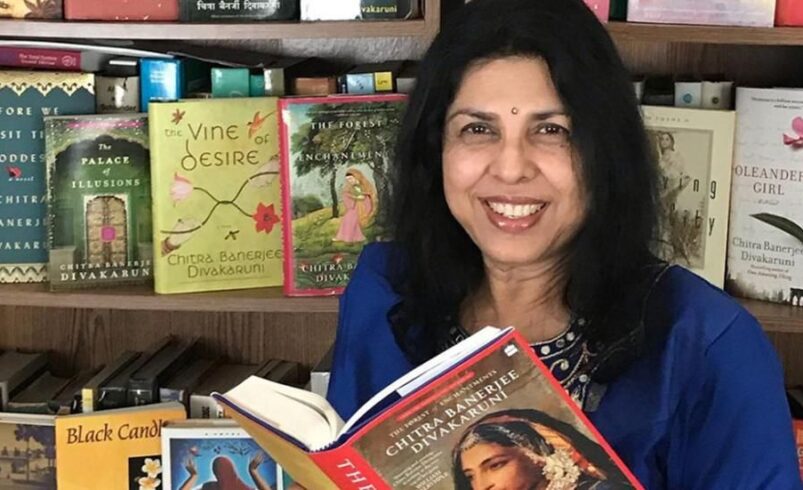
Chitra Banerjee Divakaruni is a renowned author celebrated for her compelling narratives centred around the lives of South Asian women. Hailing from Kolkata, India, she embarked on a journey that led her to pursue higher education in the United States. Divakaruni’s literary repertoire encompasses both poetry and prose, delving deeply into the immigrant experience, with a particular focus on the challenges and triumphs faced by South Asian women navigating new cultural landscapes.
Among her notable works, “The Palace of Illusions” stands out as a masterpiece of storytelling. This novel offers a fresh perspective on the ancient Indian epic, the Mahabharata, by retelling the tale from the viewpoint of Draupadi, a pivotal female character. Unlike traditional narratives that spotlight the heroic deeds of male protagonists, Divakaruni’s rendition shines a spotlight on Draupadi’s journey, illuminating her strength, resilience, and complexity.
In “The Palace of Illusions,” Divakaruni breathes life into Draupadi’s character, inviting readers to explore her innermost thoughts and emotions as she grapples with love, loyalty, and the inexorable pull of destiny. Through Draupadi’s eyes, the epic narrative unfolds with renewed depth and nuance, shedding light on timeless themes that resonate across cultures and generations.
Divakaruni’s retelling of the Mahabharata challenges traditional interpretations, offering a fresh and compelling narrative that captivates readers with its rich imagery, vivid characters, and profound insights into the human condition. “The Palace of Illusions” stands as a testament to Divakaruni’s storytelling prowess, demonstrating her ability to breathe new life into ancient tales while offering a fresh perspective on timeless themes.
Divakaruni explores various themes in her work, spanning from the Indian immigrant experience and contemporary American society to the intricacies of women’s lives and the complexities of immigration. She delves into historical and mythological narratives while also examining the dynamics of family and the joys and struggles inherent in navigating a multicultural world.
Here are our top picks:
- “The Palace of Illusions” (2008):
“Love comes like lightning, and disappears the same way. If you are lucky, it strikes you right. If not, you’ll spend your life yearning for a man you can’t have.”
In Chitra Banerjee Divakaruni’s 2008 novel “The Palace of Illusions,” readers are transported into a reimagined version of the ancient Hindu epic, The Mahabharata. The narrative unfolds through the perspective of Panchaali, a princess born from fire, much like her brother Dhri. Set in a world where divine entities and mystical forces are commonplace, Panchaali grows up in the opulent palace of her father, King Drupad, who harbours a desire for revenge against his adversary, Drona. From a young age, Panchaali is destined for a remarkable fate, prophesied by the sage Vyasa to become a powerful queen wedded to five husbands. However, Vyasa also predicts that Panchaali’s actions will lead to great upheaval in her kingdom. Throughout her journey, the god Krishna serves as Panchaali’s mentor and confidant, guiding her through the trials and tribulations of her extraordinary life.
- “Sister of My Heart” (1999):
“She was the reason my heart beat, my soul soared.”
“Sister of My Heart,” a compelling and emotionally rich novel penned by acclaimed writer Chitra Banerjee Divakaruni, was initially released in 1999. This captivating fictional narrative embarks readers on a remarkable expedition into the intertwined destinies of two Indian women, Anju and Sudha. Against the backdrop of Kolkata’s bustling streets, Divakaruni skillfully delves into the intricacies of family dynamics, cultural heritage, romantic love, and selfless devotion.
- “Mistress of Spices” (1997):
“Each spice has a special day to it. For turmeric it is Sunday, when light drips fat and butter-coloured into the bins to be soaked up glowing, when you pray to the nine planets for love and luck”
In “The Mistress of Spices,” Chitra Banerjee Divakaruni recounts the tale of Tilo, a young woman hailing from a distant era and land, who undergoes training in the mystical craft of spices and is anointed as a mistress endowed with extraordinary abilities. Following a sacred initiation involving fire, Tilo attains immortality, inhabiting the aged and weathered form of an elderly woman. She journeys across time to Oakland, California, where she establishes a shop catering to the Indian populace, utilising spices as remedies to heal and soothe her community’s ailments.
- “One Amazing Thing” (2009):
“Sometimes it takes a disaster to open the eyes of the heart.”
“One Amazing Thing” by Chitra Banerjee Divakaruni is a compelling and introspective book that examines the resilience and interconnectedness of humanity amidst adversity. Taking place during a catastrophic earthquake that leaves nine strangers stranded in a visa office in an unspecified city, the novel investigates how storytelling and shared encounters can bridge divides of culture, language, and individual histories.

- “Arranged Marriage” (1995):
“Arranged Marriage” (1995) is a collection of short stories authored by Chitra Banerjee Divakaruni, focusing on the theme of traditional Eastern arranged marriages. Through eleven distinct narratives, each presented from the viewpoint of various characters such as husbands, wives, and close relatives, the anthology delves into the multifaceted dynamics of these marriages. Divakaruni explores both functional and dysfunctional relationships, portraying instances of love as well as abuse. Rather than imposing a moral judgment on the age-old tradition, the stories offer a diverse range of perspectives, forming a nuanced portrayal of arranged marriages in the contemporary world. The anthology gained recognition for challenging stereotypes and conventional notions surrounding arranged marriages, while also subtly critiquing them
- “The Vine of Desire” (2002):
A sequel to “Sister of My Heart,”In Chitra Banerjee Divakaruni’s acclaimed novel “Sister of My Heart,” beloved characters find themselves entangled in a gripping narrative that tests the profound bond between lifelong friends. Anju and Sudha, who share a deep connection forged in childhood in India, are reunited when Sudha, now a single mother in Calcutta, accepts Anju’s invitation to join her and her husband, Sunil, in California. However, tensions arise as Sunil’s attraction towards Sudha intensifies, forcing the trio to navigate the complexities of cultural identity, personal freedoms in America, and the enduring ties that bind them to India and to each other.
- “Oleander Girl” (2013):
“Never choose something because it’s easier.”
In Chitra Divakaruni’s latest novel “Oleander Girl,” winner of the American Book Award, a young woman from a traditional Bengali background finds herself entangled in a love affair with a man from a newly wealthy business family in Kolkata. Against the backdrop of a city grappling with the clash between old traditions and modern influences, she uncovers a family secret that shatters her perception of herself. Postponing her impending marriage, she embarks on a journey to America, set against the backdrop of the post-9/11 era and India reeling from the aftermath of the Godhra Riots. “Oleander Girl” delves into the repercussions of intolerance and the complexities of desire, offering a profound exploration of transformation and identity.
- “Before We Visit the Goddess” (2016):
“I don’t put much stock in remembering things. Being able to forget is a superior skill.”
Spanning the twentieth century and traversing from rural Bengal, India, to the bustling streets of Houston, Texas, “Before We Visit the Goddess” intricately weaves together the lives of three remarkable women: Sabitri, Bela, and Tara. Sabitri, a young girl growing up in poverty, dreams of receiving an education, but her aspirations are hindered by the limited resources of her family’s sweetshop. When a wealthy local woman offers Sabitri assistance, her kindness turns perilous after Sabitri makes a grave mistake. Years later, Sabitri’s daughter, Bela, haunted by her mother’s past, flees to America with her political refugee partner, only to encounter a reality vastly different from her hopes. As Bela’s marriage falters and she seeks her own path, she imparts invaluable lessons of freedom and loyalty to her daughter, Tara, shaping her future in ways she never imagined.
- “Queen of Dreams” (2003):
“In life, it’s best not to take anything for free – unless it’s from someone who wishes you well. Everyone breathes in air, but it’s a wise person who knows when to use that air to speak and when to exhale in silence.”
Rakhi, a divorced mother and aspiring artist residing in Berkeley, California, grapples with maintaining stability amidst familial challenges and a rapidly changing world. Her mother possesses the unique gift of interpreting dreams, using this ability to offer guidance and insight into the futures of others.
- “The Unknown Errors of Our Lives” (2001):
“Don’t we all have to pay, no matter what we choose?”
A collection of stories that delve into the lives of Indian immigrants in America, exploring themes of identity, cultural clashes, and the pursuit of happiness in a new land. The collection features stories such as “Love Of A Good Man,” which follows the journey of a content Indian wife forced to confront her past when her estranged father seeks to meet his grandson. In “Mrs. Dutta Writes A Letter” (recognized in Best American Short Stories, 1999), a widow residing in her son’s California home grapples with the realization that her traditional customs are viewed as outdated by her daughter-in-law. “The Blooming Season For Cacti” tells the tale of two women displaced from their homeland due to violence and deceit, who discover unexpected comfort in each other’s companionship. Lastly, in the titular story, an artist is compelled to confront her fiance’s past just days before their wedding, prompting a pivotal decision.
These books showcase Divakaruni’s talent for storytelling and her ability to weave together richly textured narratives that resonate with readers across cultures and generations. To find more such insightful summaries and book insights from your favourite authors, Download the Wizdom app!

Kavya Sriram
Kavya Sriram is currently pursuing a triple major in Journalism Psychology and English. In her free time you can find her arguing the complexities of lana del rey’s albums or petting cats. Kavya loves to read and argue that “the book is better than the film”.
Recent Posts
- 25 Top Quotes from The 10X Rule to Supercharge Your Ambition
- 10 Books You Must Read to Succeed in Your Career
- 30 Little Tricks for Big Success in Relationships
- 25 Life-Changing Self-Help Books to Read This December: Boost Your Mood and Your Mind
- 25 Amazing Self-Care Tips for December: Wrap Yourself in Joy, Not Stress









